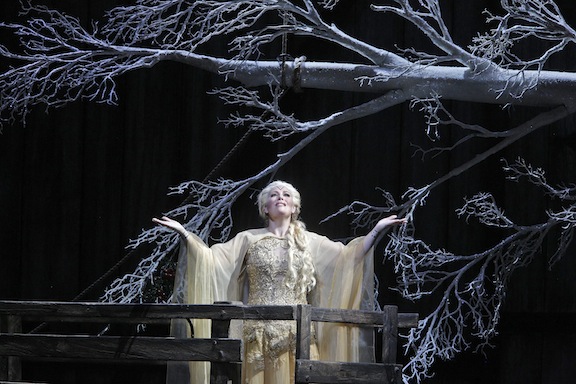 Wonderful singing
Wonderful singing
First of all, I’m going to say what has undoubtedly been said by anyone attending these performances: the most endearing performers in San Francisco Opera’s production of Norma were the two exquisitely adorable (non-singing) children who played Norma’s children. Where did they find Oliver Kuntz and Miles Sperske? Sweetly, they fulfilled our need for the tender and innocent in an otherwise chilly and emotionally fraught opera.
Not to say that Norma hasn’t value and attraction as a theatrical piece. The story, which follows the usual concerns of Italian opera – illicit love, jealousy, vengeance and tragic reconciliation, vibrates with fine and equally 19th-century Italian music, full of lyricism, bravado, a strong metric beat and multiple opportunities to display the singers’ excellent vocal talents.
And vocal talents reigned in this production. Beginning with Sondra Radvanovsky as the druidic priestess Norma, who has fallen in love with the Roman proconsul Pollione and thereby compromised her loyalties to her people. Radvanovsky, decked out in a white wig, is the personification of dark prophetic forces as she encourages the Gauls to peace or war against their conquerors, the Romans. Her voice was full and as glowingly bright as the moon to which she sang the superlative and familiar “Casta diva”, and liquidy smooth throughout the rest of the opera with an impressive floating pianissimo.
Radvanovsky was matched with young mezzo-soprano Jamie Barton as Adalgisa, the young priestess whom Pollione abandons Norma for. Barton, while having a substantial voice creates a line that carries a lyric sweetness in the upper registers, while is capable of reaching down into the deepest parts of the voice. The duets between the two sopranos were as well achieved as could be imagined.
American tenor Russell Thomas took over from Marco Berti, when the Italian tenor left the production for personal reasons last week. Russell, who sang the role of Pollione, the tediously predictable male wanton who seduces both women with the same lines, fit in seamlessly with the web of vocal splendor woven by the two sopranos. His voice is big, warm and resonant.
Christian Van Horn cut an imposingly tall figure as Norma’s father Orovesco, the leader of the Druids. His bass-baritone voice commanding.
The production – sets, costuming, lighting and direction – were rather old-fashioned in concept and confusing in historic and mythic placement. Some of that confusion is undoubtedly from the Bellini/Romani opera. Written by two Italians about the conflict between the Romans and the Gauls, the opera was bound to be oddly slanted, if only from the fact that opera at that time was almost always about various kinds of love and infidelity. Setting enabled the writers to add a dash of exoticism for thrill-seeking audiences. And I give Bellini and Romani credit for having chosen a decent ending for the lovers, one not too patently misogynistic in its ultimate sacrifices for love.
Additional confusions about the exotic locale in time and space are undoubtedly due to my faulty memory. In any event I found the birch trees out of place (and that’s just a start), identifying them with Russian folk tales and mythology and knowing the Gaulish dominance only spread as far as Hungary and by the time of the Roman rule was considerably reduced. I’ll have to get out my old Asterix comics again.
One thing is very clear in my mind though. The Romans were appalled by the Gauls in battle, who with their reddish hair and tattoos tore into battle wearing nothing but their gold and silver torcs. A sobering thought for the chorus in their fur stoles and Viking leggings.
– Jaime Robles
San Francisco Opera’s production of Vincenzo Bellini’s bel canto masterpiece, Norma, continues through September 30 at the War Memorial Opera House. For information and tickets, call 415-864-3330 or visit sfopera.com.
Photo: Sondra Radvanovsky as the priestess Norma in the San Francisco Opera production. Photo by Cory Weaver.
